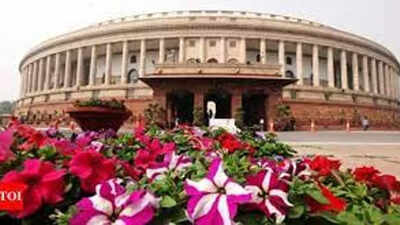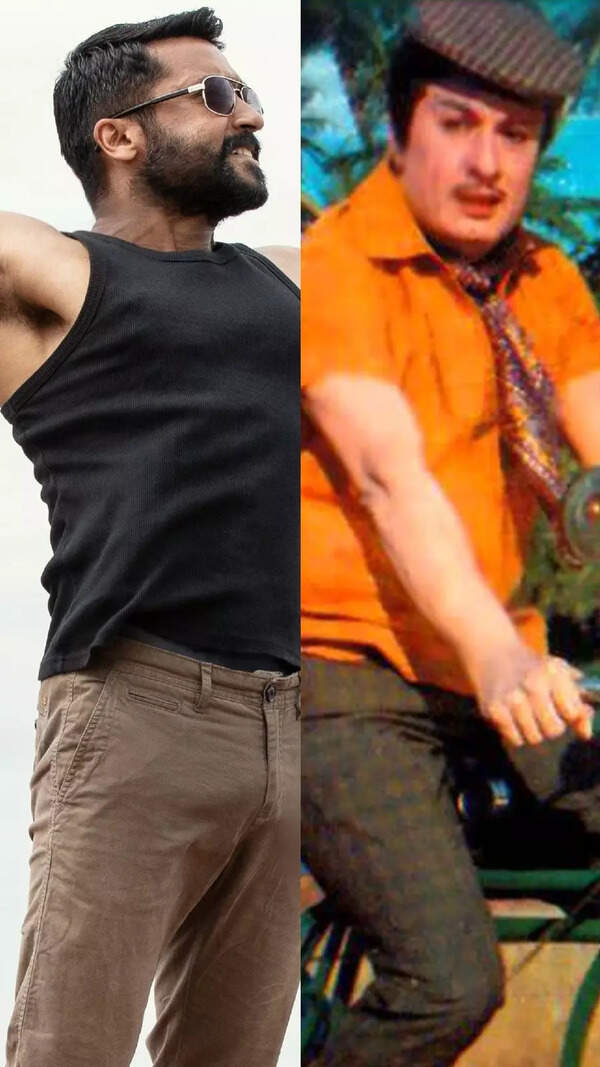Top Searches
- News
- India News
- Rajya Sabha functions for first time this monsoon session amid three adjournments
Rajya Sabha functions for first time this monsoon session amid three adjournments

NEW DELHI: The Rajya Sabha functioned on Monday for the first time since the start of this monsoon session, even as the Opposition continued to disrupt the proceedings with noisy protests and sloganeering, forcing three adjournments.
While a discussion on the bill seeking to prohibit financing of activities related to weapons of mass destruction was taken up, the speakers from the Opposition chose not to join the discussion.
The din by the Opposition parties – which started after the chair announced rejection of notices given by several Opposition MPs for a discussion on price rise, inflation and GST hike under Rule 267 -- also prevented the debate on a calling attention motion on the effects of Covid, moved by NCP MP Fauzia Khan.
When the House assembled at 2 pm, the deputy chairman announced the chair’s decision rejecting notices under Rule 267 (providing for suspension of business) on multiple issues like misuse of agencies like CBI and ED by the government and price rise.
Leader of Opposition Mallikarjun Kharge accused the government of “running away” from the discussion. This was strongly contested by Leader of Rajya Sabha Piyush Goyal who said the government was more than willing for the debate on price rise but it must wait as finance minister Nirmala Sitharaman is recovering from Covid. “The government had taken several steps to keep price rise in check, unlike many foreign nations who are fighting double-digit inflation. What have the Opposition-ruled governments done? They are yet to cut VAT on petrol and diesel. In fact, this is why they do not want a discussion in the Parliament,” he stated.
After the House assembled at 4pm, a discussion was initiated on the Weapons of Mass Destruction and their Delivery Systems (Prohibition of Unlawful Activities) Act, 2005, as passed by the Lok Sabha. Many Opposition speakers on the list – Shaktisinh Gohil, Bikash Ranjan Bhattacharya, Vaiko and Fauzia Khan – refused to join the debate, leaving only the speakers from the BJP or its allies to argue on the bill. The Opposition MPs, meanwhile, kept raising points of order from time to time to interrupt the debate.
The speakers – including Mahesh Jethmalani, GVL Narasimha Rao, Brij Lal, GK Vasan and Ajay Pratap Singh – endorsed the bill saying that it was necessary to ensure that weapons of mass destruction do not get into the hands of the terrorists and non-state actors and also to bring the law in line with the UNSC resolution 1540 that requires member states to pass laws to curb funding and financing of WMDs.
However, the MPs also used the debate to corner the past UPA governments for failing to do enough to tackle terrorism – unlike the Modi government that has been taking up terrorism strongly at all international forums – by citing the series of blasts during its tenure. Rao and Brij Lal accused the past opposition governments of appeasing a section of minorities and instead seeking to “frame” people and outfits representing the majority community. Rao cited the Samjhauta blast probe to claim how the investigation was politicised to go after accused from the majority community, who were later acquitted.
Lal, also a former DGP of UP, said as many as 1,184 people had died in terror attacks and blasts during the UPA rule.
Jethmalani said that the 2005 Act would need to be revisited later to provide for punishments for WMD financing. Ajay Pratap Singh said the law would also prevent WMDs from getting into the hands of Naxalites.
The bill will be taken up for passage on Tuesday.
While a discussion on the bill seeking to prohibit financing of activities related to weapons of mass destruction was taken up, the speakers from the Opposition chose not to join the discussion.
The din by the Opposition parties – which started after the chair announced rejection of notices given by several Opposition MPs for a discussion on price rise, inflation and GST hike under Rule 267 -- also prevented the debate on a calling attention motion on the effects of Covid, moved by NCP MP Fauzia Khan.
When the House assembled at 2 pm, the deputy chairman announced the chair’s decision rejecting notices under Rule 267 (providing for suspension of business) on multiple issues like misuse of agencies like CBI and ED by the government and price rise.
Leader of Opposition Mallikarjun Kharge accused the government of “running away” from the discussion. This was strongly contested by Leader of Rajya Sabha Piyush Goyal who said the government was more than willing for the debate on price rise but it must wait as finance minister Nirmala Sitharaman is recovering from Covid. “The government had taken several steps to keep price rise in check, unlike many foreign nations who are fighting double-digit inflation. What have the Opposition-ruled governments done? They are yet to cut VAT on petrol and diesel. In fact, this is why they do not want a discussion in the Parliament,” he stated.
After the House assembled at 4pm, a discussion was initiated on the Weapons of Mass Destruction and their Delivery Systems (Prohibition of Unlawful Activities) Act, 2005, as passed by the Lok Sabha. Many Opposition speakers on the list – Shaktisinh Gohil, Bikash Ranjan Bhattacharya, Vaiko and Fauzia Khan – refused to join the debate, leaving only the speakers from the BJP or its allies to argue on the bill. The Opposition MPs, meanwhile, kept raising points of order from time to time to interrupt the debate.
The speakers – including Mahesh Jethmalani, GVL Narasimha Rao, Brij Lal, GK Vasan and Ajay Pratap Singh – endorsed the bill saying that it was necessary to ensure that weapons of mass destruction do not get into the hands of the terrorists and non-state actors and also to bring the law in line with the UNSC resolution 1540 that requires member states to pass laws to curb funding and financing of WMDs.
However, the MPs also used the debate to corner the past UPA governments for failing to do enough to tackle terrorism – unlike the Modi government that has been taking up terrorism strongly at all international forums – by citing the series of blasts during its tenure. Rao and Brij Lal accused the past opposition governments of appeasing a section of minorities and instead seeking to “frame” people and outfits representing the majority community. Rao cited the Samjhauta blast probe to claim how the investigation was politicised to go after accused from the majority community, who were later acquitted.
Lal, also a former DGP of UP, said as many as 1,184 people had died in terror attacks and blasts during the UPA rule.
Jethmalani said that the 2005 Act would need to be revisited later to provide for punishments for WMD financing. Ajay Pratap Singh said the law would also prevent WMDs from getting into the hands of Naxalites.
The bill will be taken up for passage on Tuesday.
FOLLOW US ON SOCIAL MEDIA
FacebookTwitterInstagramKOO APPYOUTUBE
Start a Conversation
end of article










